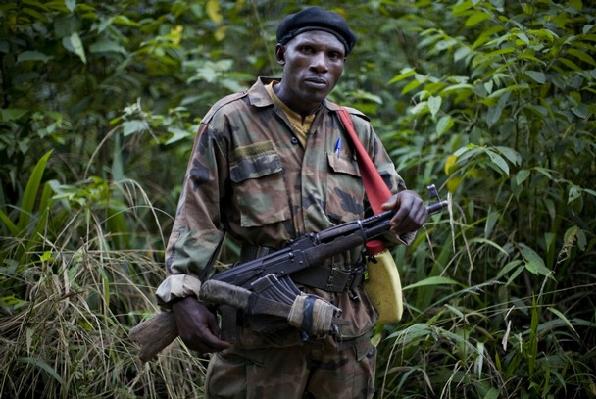BBC News
02/10/07
 The BBC has found evidence suggesting that Hutu militias are backing the army in the Democratic Republic of Congo.
The BBC has found evidence suggesting that Hutu militias are backing the army in the Democratic Republic of Congo.
The UN and the army deny co-operating with the rebel groups in North Kivu. But a UN source told the BBC that the Congolese Mai Mai militia and Hutus had come together as the Front for the Liberation of North Kivu. The FLNK says it patrols with the army in eastern DR Congo to counter renegade general, Laurent Nkunda, where recent instability has displaced some 300,000.
Ethnic tension following the 1994 genocide of Tutsis and moderate Hutus in Rwanda lies at the heart of the current fighting.
Gen Nkunda says he is defending DR Congo's Tutsis from Hutus implicated in the Rwandan killings, who fled across the border to DR Congo and formed the Democratic Liberation Forces of Rwanda (FDLR).
He says his uprising of Congolese Tutsis was in self-defence against Hutu militias backed by the army. Rwanda denies supporting Gen Nkunda.
A UN source told the BBC's Arnaud Zajtman that the new alliance included at least one former FDLR officer, who he identified as "Commander Jean-Claude".
And the FLNK's Maj Kabila told our corresppndent the force was Mai Mai but they were patrolling jointly with the Hutu rebels – and the army.
"There is no difference between the Congolese army and us – we are all Congolese so we can help each other against the men of Laurent Nkunda," said Maj Kabila.
Our correspondent then spoke to his commander, Maj Kasereka, who specified the kind of help his men are giving the army.
"We are patrolling with the soldiers of Congo… and we will chase Laurent Nkunda from Congo back to Rwanda," the FLNK commander Maj Kasereka said.
He said he was working specifically with the 6th Brigade.
"I am all the time contacting the regional commander. That is why I am saying that the government of Congo are with me," he told the BBC.
Army denials
The army has regularly denied any links with the FDLR.
Questioned by our correspondent, the army's deputy commander in North Kivu, Col Delphin Kayimbi, also denied there were any ties with the new militia group.
|
|
The UN mission in DR Congo (Monuc) is similarly sceptical.
"It could be at the local level there are people who are disobeying these rules but definitely not with the support of the FARDC [army]," a Monuc general told our correspondent.
However the UN is giving logistical support to the FARDC, carrying Congolese soldiers and munitions on UN helicopters and would be concerned if this might mean they were indirectly supporting the FNLK or FDLR, if they are proved to be associating with the army.
Attempts to broker a ceasefire have foundered and Gen Nkunda's force has been attacking both army positions and villages, forcing thousands of people to flee their homes in North Kivu for UNHCR camps closer to the regional capital of Goma.
All sides in the fighting are accused of multiple war crimes, including rape, the unlawful killing of civilians and arbitrary detentions of minors.
A five-year civil war in DR Congo officially ended in 2002, with a death toll approaching four million and last year's elections, won by President Joseph Kabila, were supposed to draw a line under the conflict.
The UN has 17,600 peacekeepers in DR Congo – the largest such force in the world, 4,300 of them in North Kivu alone.
BBC NEWS
